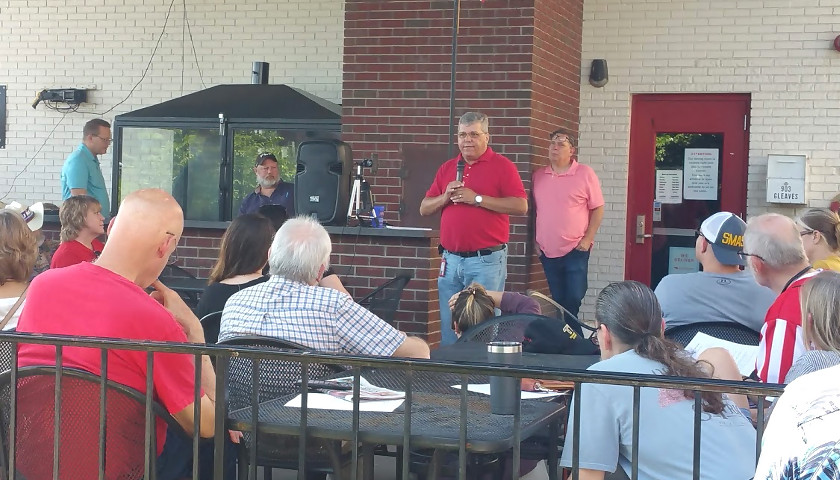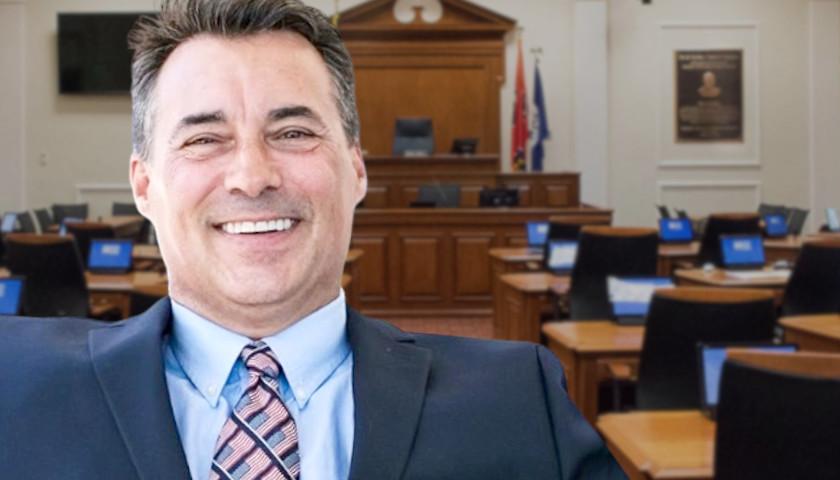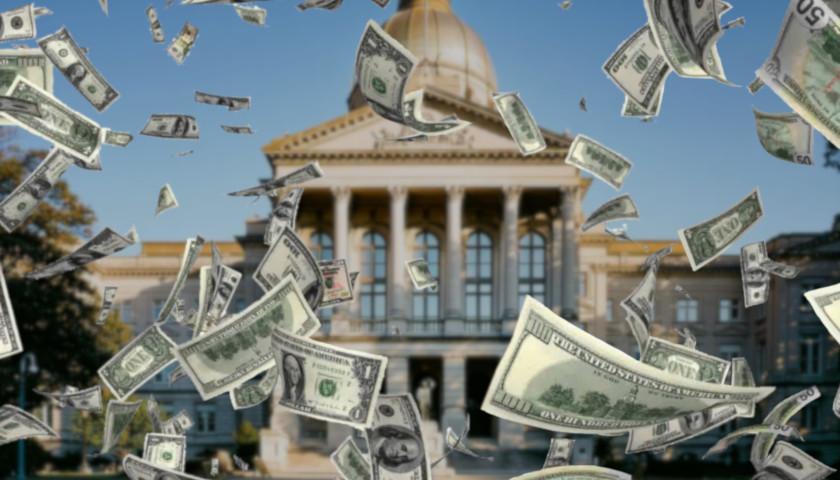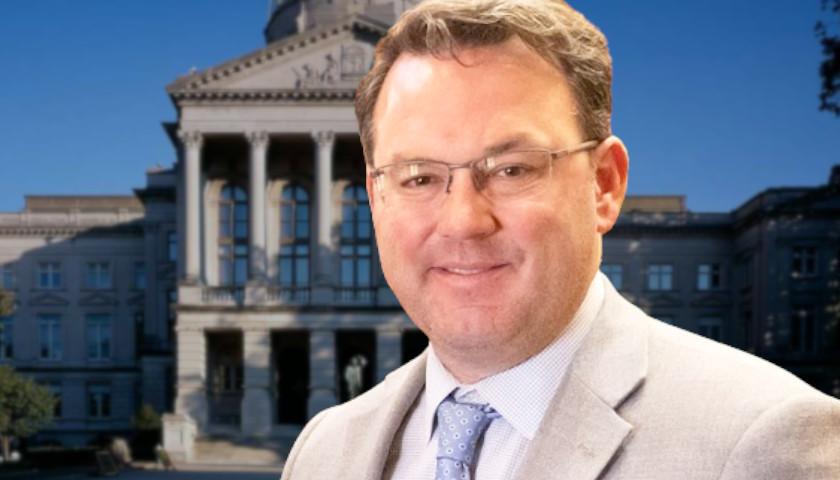NASHVILLE, Tennessee – Metro Councilman-at-Large Steve Glover and owner of Peg Leg Porker, Carey Bringle, called for at least another week to review the city’s budget for the upcoming 2021 fiscal year.
Glover has been outspoken about Mayor Cooper’s 32 percent proposed property tax increase, and native Nashvillian Pringle made news when he shared his scathing letter to Mayor Cooper and the Metro Council about the proposed property tax increase.
To a gathering Saturday of about 100 people on the deck of the barbecue restaurant located in downtown’s Gulch area, Glover introduced the highlights of his substitute budget. Both he and Bringle said, equally important, citizens deserve more time to review all options to Mayor Cooper’s version of the fiscal year 2021 budget.
Mayor Cooper introduced his budget in April, which includes a 5 percent spending increase over the current year, even though he estimated there to be shortfalls of $215.8 million this year and $280.7 million next year.
To make up for the shortfalls and the increased spending, Mayor Cooper’s budget includes a 32 percent property tax increase taking the rate from $3.15 to $4.15.
Before going over the highlights of his substitute budget, Glover pointed toward the flag and reminded attendees that it was 76 years ago that Americans stormed the shores of Normandy on D-Day and asked for a moment of silence.
When it comes to the budget, Glover said that he believed that nothing should be taken off the table and that every option available should be looked at.
He pointed out that the city “stinks” at both money management, alluding to the balance sheet, as well as land management, referencing properties that were purchased with bonds but never turned into anything.
Glover revealed that during a recent meeting between the two, the Mayor told Glover that with the budget, “We have to be fair.”
Glover said he took the Mayor’s comments to heart, such that his proposal includes cuts and out of the box thinking so that the burden doesn’t fall entirely on the back of property owners.
After offering brief explanations of some of the idiosyncrasies of the Metro Nashville charter, Glover advised that the budget does not have to be passed until June 30 at 11:59 p.m.
In other words, said Glover, the process should not be rushed through with a vote this Tuesday, June 9.
If a substitute budget is not passed by a majority vote of 21 Council members, the Mayor’s proposed budget with its increased spending and 32 percent property tax increase automatically goes into effect for July 1.
Glover is aware of other Council members who have prepared substitute budgets, but under Sunshine Laws, Council members cannot get together to discuss them except in public meetings. Since the nearly 11-hour meeting last Tuesday was consumed by calls to defund the police during the public hearing portion, Council members did not work on the budget.
A handout that Glover provided to attendees included proposed reductions to the budget:
Staff savings through various options – $35 million
Other reductions – $47 million
Potential COVID replacement – $10 to $20 million
Glover explained that the Council cannot demand furloughs or layoffs of city employees, but can cut money to the departments, leaving the departments to decide how to deal with the reductions.
He took $10 million out of the Barnes Fund which goes toward affordable housing, because it is “operational money” or cash, when the city otherwise has land available.
Glover said he doesn’t want to turn his back on affordable housing, but his proposal will utilize city land to accomplish the same objective more efficiently and productively while creating recurring revenue for the city.
Glover’s proposal also calls for the restoration of other funding, including employees’ step pay, Community Education, Opportunity Now and Nashville Grad for a total of $7 to $12 million.
The employee step increase is something that Glover said was negotiated at the time of hiring and goes to the lowest paid employees who won’t be getting a cost of living adjustment.
To offset the shortfalls and the restoration of funding, Glover proposes:
Property tax increase of $0.31 or 10 percent – $101.5 million
Wheel tax – $35 million
Land management – $125 million
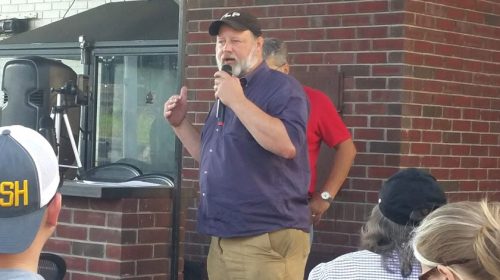
After offering a detailed example of the amount of tax dollars that Bringle would keep in his pocket by paying the lower property tax rate in conjunction with an increased wheel tax, Glover offered, “Last time I checked, you manage your money a whole lot better than government manages your money.”
One of the other reasons Glover has included a wheel tax increase is because he can sunset it on a specific date and he can also pull the proposal if the 32 percent property tax increase progresses.
With regard to the Nashville’s property tax rate being promoted as being historically low, Glover explained that is true, but the property values are also at a historical high.
To demonstrate the impact of the property values, Bringle compared his barbecue business to that of the Rendezvous restaurant in downtown Memphis, which the Peg Leg Porker is modeled after.
In all aspects, the two are the exact same type of business from being downtown, close to the convention center and about the same square footage, except that the Rendezvous has been around for 70 years and has three times the revenue, said Pringle.
While the Memphis property tax rate is $7.25 and Nashville’s is $3.15, the Rendezvous pays $18,000 a year in property tax while Peg Leg Porker pays $55,000.
If Mayor Cooper’s 32 percent property tax increase goes into effect, Bringle’s property taxes will go up to over $72,000 a year.
That $6,000 per month, Bringle said, is just for him to operate his business downtown and doesn’t include his mortgage, debt service or cost of goods.
Glover made the point that Nashville’s property tax rate, which the Mayor compares to Tennessee’s metropolitan counties with higher rates, is not competing against Knox, Hamilton or Shelby County.
Rather, Glover said, Nashville/Davidson County is competing against the other middle Tennessee counties.
Meanwhile, Glover’s $0.31 or 10 percent property tax increase will put the rate at $3.46 or $3.46, which keeps Nashville/Davidson County competitive with the average $3.38 property tax rate of the adjoining middle Tennessee counties.
That competitiveness will help keep builders and contractors building and selling homes as well as renting apartments, Glover maintains.
On the other hand, “If we raise taxes so drastically, people will exit and magnify the problem, and we all lose in the long run,” said Glover.
Glover concluded with next steps, telling attendees that they need to reach out to their Council members and tell them that they need to spend more time considering all options.
He also suggested that Council members be told that they should consider the morale of the employees who work for all Nashvillians and to care about taxpayers’ money, the city, state and country as much as their constituents do.
Pointing out that this doesn’t have anything to do with the flavor of political beliefs, Glover said this is a local issue that affects pocket books on a daily basis.
As such, Glover said it is owed to every person to do what is right, and what is right is to spend the extra time – another seven days – to discuss all options and combine for an alternate budget.
The entire event can be watched here:
—
Laura Baigert is a senior reporter at The Tennessee Star.

